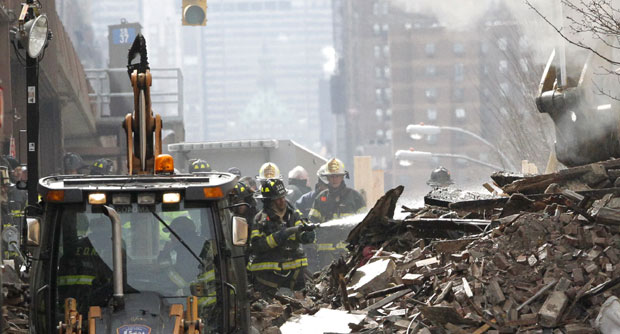
A firefighter applies water to rubble a day after a gas leak-triggered explosion, Thursday, March 13, 2014, in East Harlem, New York. Rescuers working amid gusty winds, cold temperatures and billowing smoke pulled additional bodies Thursday from the rubble of two apartment buildings that collapsed Wednesday. AP
NEW YORK — All eight people reported missing have been found and their bodies identified at the site of a deadly gas explosion that leveled two New York City buildings, although the rescue operation will continue in case there are unknown survivors still in the rubble, the city fire commissioner said.
Many of the dead in Manhattan’s Harlem neighborhood had foreign roots and plans were being made to return some of the bodies to their native lands.
About 60 to 70 percent of debris has been cleared, said New York City Fire Commissioner Salvatore Cassano. He said workers hope to clear all the debris by mid-day Saturday. That’s when detectives and fire marshals will be able to access the basements of the buildings to begin their investigation into what might have caused the blast.
Mayor Bill de Blasio said more than 100 people displaced by the blast will be provided temporary and long-term housing.
More than 60 people were injured after the deafening blast Wednesday morning destroyed two five-story East Harlem apartment buildings at Park Avenue and 116th Street that were served by an 1887 cast-iron gas main.
Investigators were trying to pinpoint the leak and determine whether it had anything to do with the city’s aging gas and water mains, some from the 1800s.
Fire and utility officials said that if the buildings were plagued in recent days or weeks by strong gas odors, as some tenants contended, they have no evidence anyone reported it before Wednesday.
The blast erupted about 15 minutes after someone from a neighboring building reported smelling gas, authorities said. The Con Edison utility said it immediately sent workers to check out the report, but they got there too late.
Among the dead were Andreas Panagopoulos, a 43-year-old Greek-born musician who played guitar and key board and worked from their home for an online site that manages a film and photography directory. His wife, Liseth Perez-Almeida, planned to take his body back to Greece for burial.
A Mexican-born woman, 43-year-old Rosaura Barrios Vazquez was also killed, along with her U.S.-born daughter, 22-year-old Rosaura Hernandez Barrios, who had been making her way up in the restaurant world. Mexican authorities said their bodies would be flown to Mexico City at the government’s expense.
Also killed were Griselde Camacho, 45, a Hunter College security officer, Carmen Tanco, 67, a dental hygienist who took part in church-sponsored medical missions to Africa and the Caribbean; George Ameado, 44, a handyman who lived in one of the buildings that collapsed; and Alexis Salas, 22, a restaurant worker.
Police said body of the eighth person, a woman, was pulled from the rubble Thursday evening.
The working-class neighborhood around the site was once known as Spanish Harlem because of its large population of Puerto Ricans but now has many Asians and other ethnic groups. The neighborhood is gentrifying but still has a high crime rate, fueled by drugs and gangs.
Robert Sumwalt, a team member from the federal National Transportation Safety Board, said the latest information seems to support the hypothesis that the explosion was caused by a gas leak. Sumwalt said Friday that the utility Consolidated Edison dug 50 holes about up to 24 inches (60 centimeters) deep around the blast site and measured gas levels in those cavities soon after the explosion.
He said the gas concentration was up to 20 percent in at least five spots. He says normal levels in New York City soil should be zero. He said workers have begun the process of pressure testing pipes to identify possible holes.
However, he said NTSB investigators had been unable to conduct a fuller examination because of the rescue effort underway, and it was unclear whether the leak came from inside or outside the buildings.
He said there had also been a water main break at the site, but it was unknown if that contributed to the gas explosion or was caused by it. The water main was installed in 1897, according to the city.
The NTSB investigates pipeline accidents in addition to transportation disasters.
Aging infrastructure — crumbling bridges, highways, water mains and gas lines — has become a major concern in recent years, especially in older cities in the Northeast, and has been blamed for explosions, floods and other accidents.
RELATED STORIES
New York gas blast death toll rises to eight
Gas blast destroys 2 NY buildings; 5 people dead
Gas leak caused New York buildings collapse— mayor